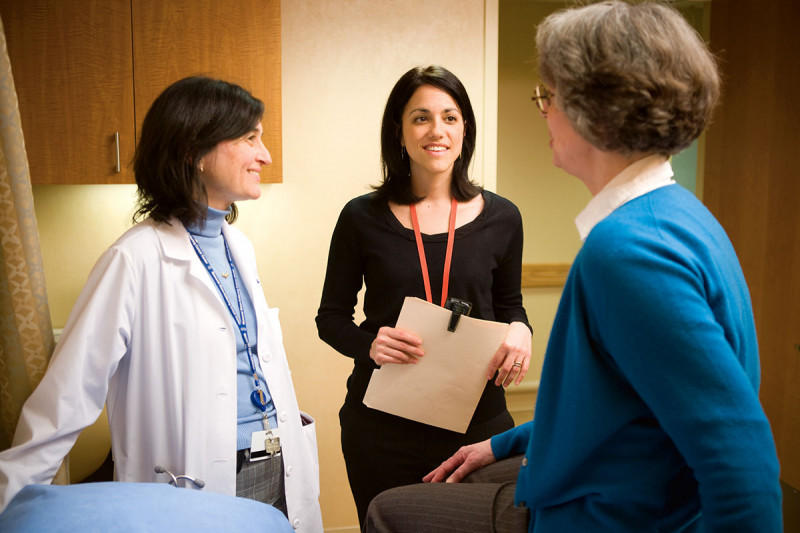
Cytoreductive surgery for advanced ovarian cancer is safe in older women, even those who present with frailty, according to our recent prospective study of 42 patients treated at Memorial Sloan Kettering Cancer Center.
Despite a high rate of preoperative impairments, there was a low rate of postoperative events and no 180-day mortality in women with advanced ovarian cancer who underwent surgery — either primary debulking surgery or neoadjuvant chemotherapy followed by interval debulking surgery. (1)
Our findings, published in the journal Gynecologic Oncology, underscore the importance of collaboration between geriatricians and surgeons to co-manage this patient population preoperatively and postoperatively within a tertiary care center.
Surgery in Older Patients
Three-quarters of women with ovarian cancer have advanced stage disease and require treatment with extensive surgery and chemotherapy. More than half of patients with newly diagnosed disease are 65 years of age or older. (2), (3) Older women derive the same cancer-related survival benefit from aggressive surgery for advanced-stage disease but have a higher risk of surgical morbidity and mortality. (4) They are commonly excluded from clinical trials (3), (5), (6) and are less likely to be offered surgery, despite the evidence demonstrating feasibility in this age group. (7)
Geriatric Assessment
The gold standard for assessing frailty is the geriatric assessment. Rather than using chronological age alone, it evaluates functional and nutritional status, comorbidity and medications, cognition, social support, and psychological status — multiple domains for which there are known, increased risks of surgery and toxicities related to chemotherapy. (2), (8)
In a study published recently in the Journal of the National Comprehensive Cancer Network, together with our colleagues at MSK, we found that the geriatric assessment is strongly associated with six-month mortality in geriatric patients, whereas the American Society of Anesthesiologists Physical Status (ASA-PS) — the most common method for evaluating preoperative functional status — is not. (9)
At MSK, many of our patients over the age of 75 are referred to the Geriatrics Service for preoperative evaluation, unless the surgical team agrees that patients have received prior clearance from either their primary care provider or a subspecialist such as a cardiologist. The unique collaboration between geriatric and surgical services has been taking place at MSK since the inception of the Geriatrics Service in 2009.
We use the electronic Rapid Fitness Assessment (a patient-reported, electronic version of the geriatric assessment), which takes about 10 minutes and allows for more efficient data capture than other methods. (10)Following preoperative geriatric evaluation, the surgical team determines the best cancer treatment plan for each patient using institutional and national guidelines.
Study Results
In the present study, 38 of the 42 patients had newly diagnosed advanced ovarian cancer, and four had recurrent ovarian cancer. Significant preoperative impairments for the total group were as follows: high level of distress (71 percent), functional dependency (59 percent), limited social activity (59 percent), depression (57 percent), gait impairment as determined by a slow Timed Up and Go test (54 percent), Karnofsky Performance Score ≤to 80 (41 percent), poor social support (43 percent), polypharmacy (35 percent), weight loss > 10 lbs. (25 percent), fall history (24 percent), and cognitive impairment (13 percent). The median number of comorbidities was three. (1)
Of the 38 newly diagnosed patients, 26 (68 percent) had stage IIIC, and 11 (29 percent) had stage IV ovarian cancer. Sixteen women (42 percent) underwent primary debulking surgery, and 22 (58 percent) were treated with neoadjuvant chemotherapy followed by interval debulking surgery. The optimal debulking rate was 97 percent, and the complete gross resection rate was 63 percent. (1)
Results were strong for this population of frail women: Twelve-month survival was 93.3 percent and there was no 180-day mortality. (1)
Any complication, minor complication, and major complication occurred in 58 percent, 55 percent, and 8 percent of study participants respectively. One patient was admitted to the intensive care unit, 26 percent of women visited an ER within 30 days, and 10 percent of patients were readmitted. (1)
Advancing Ovarian Cancer Care in Older Women
Care for older women with ovarian cancer is multimodal and complex. Older women are still seen as unable to tolerate surgery and treated with neoadjuvant chemotherapy, despite the latest evidence from a randomized non-inferiority trial (11) and several retrospective studies (12)that show a survival benefit with primary debulking surgery.
Frailty has been associated with poorer outcomes. For example, a systematic review combining 20 studies and data for 3,000 older patients with solid or hematologic malignancies showed that frail patients who had surgery for cancer treatment had a 3.19 times higher chance of a 30-day postoperative complication and a 2.67 times greater risk of 30-day postoperative mortality. (13)However, only one of the 20 studies included women with gynecologic cancers, (14)and it evaluated results for only ten patients with ovarian cancer. Clearly, we need more research focused on frail older women with ovarian cancer.
At MSK, our Geriatrics Service is committed to providing older adult patients with the treatment and support they need. Our interdisciplinary team includes oncologists, geriatricians, registered nurses, nurse practitioners, social workers, nutritionists, pharmacists, psychiatrists, and physiotherapists. We collaborate with surgeons to determine how well patients may tolerate a specific cancer therapy and what precautions need to be taken to ensure the best possible outcomes.
In addition to preoperative evaluations and postoperative management, geriatric services include consultations for aging-related impairments such as cognitive decline, fall prevention, multiple comorbid conditions, and polypharmacy.
